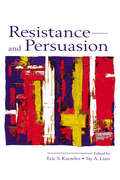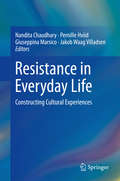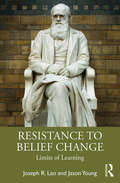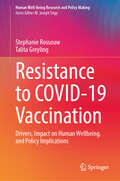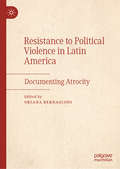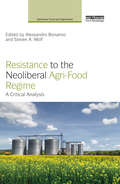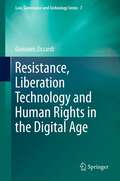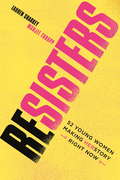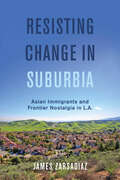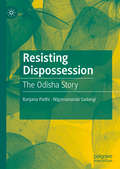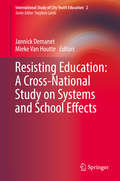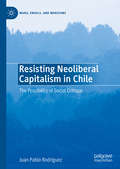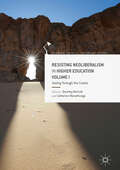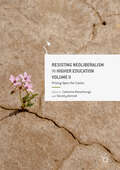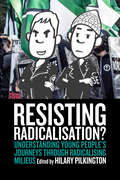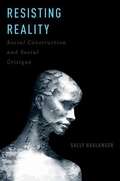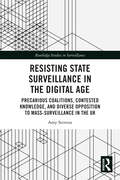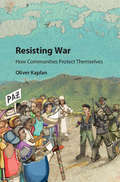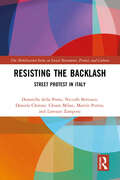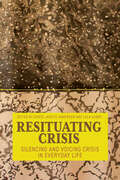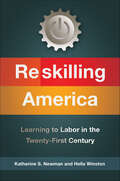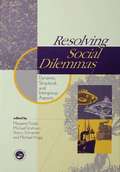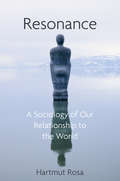- Table View
- List View
Resistance and Persuasion
by Eric S. Knowles Jay A. LinnResistance and Persuasion is the first book to analyze the nature of resistance and demonstrate how it can be reduced, overcome, or used to promote persuasion. By examining resistance, and providing strategies for overcoming it, this new book generates insight into new facets of influence and persuasion. With contributions from the leaders in the field, this book presents original ideas and research that demonstrate how understanding resistance can improve persuasion, compliance, and social influence. Many of the authors present their research for the first time. Four faces of resistance are identified: reactance, distrust, scrutiny, and inertia. The concluding chapter summarizes the book's theoretical contributions and establishes a resistance-based research agenda for persuasion and attitude change. This new book helps to establish resistance as a legitimate sub-field of persuasion that is equal in force to influence. Resistance and Persuasion offers many new revelations about persuasion: *Acknowledging resistance helps to reduce it.*Raising reactance makes a strong message more persuasive.*Putting arguments into a narrative increases their influence. *Identifying illegitimate sources of information strengthens the influence of legitimate sources.*Looking ahead reduces resistance to persuasive attempts. This volume will appeal to researchers and students from a variety of disciplines including social, cognitive, and health psychology, communication, marketing, political science, journalism, and education.
Resistance in Everyday Life
by Nandita Chaudhary Giuseppina Marsico Pernille Hviid Jakob Waag VilladsenThis book is about resistance in everyday life, illustrated through empirical contexts from different parts of the world. Resistance is a widespread phenomenon in biological, social and psychological domains of human cultural development. Yet, it is not well articulated in the academic literature and, when it is, resistance is most often considered counter-productive. Simple evaluations of resistance as positive or negative are avoided in this volume; instead it is conceptualised as a vital process for human development and well-being. While resistance is usually treated as an extraordinary occurrence, the focus here is on everyday resistance as an intentional process where new meaning constructions emerge in thinking, feeling, acting or simply living with others. Resistance is thus conceived as a meaning-making activity that operates at the intersection of personal and collective systems. The contributors deal with strategies for handling dissent by individuals or groups, specifically dissent through resistance. Resistance can be a location of intense personal, interpersonal and cultural negotiation, and that is the primary reason for interest in this phenomenon. Ordinary life events contain innumerable instances of agency and resistance. This volume discusses their manifestations, and it is therefore of interest for academics and researchers of cultural psychology, cultural studies, anthropology, sociology, and human development.
Resistance to Belief Change: Limits of Learning
by Jason Young Joseph R. LaoThis book examines the human proclivity to resist changing our beliefs. Drawing on psychological, neurological, and philosophical research, and integrating topics as wide ranging as emotion, cognition, social (and physical) context, and learning theory, Lao and Young explore why this resistance to change impedes our learning and progression. They also suggest that failure to adapt our beliefs to available and informed evidence can incur costs that may be seen in personal growth, politics, science, law, medicine, education, and business. Resistance to Belief Change explores the various manifestations of resistance, including overt, discursive, and especially inertial forms of resistance. As well as the influential factors that can impact upon them, the book also examines how the self-directed learner, as well as teachers, may structure the learning experience to overcome resistance and facilitate progressive and adaptive learning. Lao and Young find that the impediments to learning and resistance to change are far more prevalent and costly than previously suggested in research, and so this book will be of interest to a range of people in cognitive development, social psychology, and clinical and educational psychology.
Resistance to COVID-19 Vaccination: Drivers, Impact on Human Wellbeing, and Policy Implications (Human Well-Being Research and Policy Making)
by Stephanie Rossouw Talita GreylingThis book presents advanced methodologies for analyzing attitudes towards the COVID-19 vaccine across 10 countries spanning both the Northern and Southern hemispheres, employing cutting-edge Big Data and Fourth Industrial Revolution (4IR) techniques. Serving as an important resource for policymakers, it addresses attitudes towards and causes of growing vaccine hesitancy —a pressing concern identified by the World Health Organization as a top 10 global health threat. Moreover, the book sheds light on key factors associated with positive vaccine attitudes, aiming to bolster vaccine uptake rates. The authors explore the role of happiness in shaping health-related decision-making, offering actionable policy recommendations for governments. By sharing best-case practices, they equip policymakers and health officials worldwide with the necessary strategies to address future pandemics effectively.
Resistance to Innovation
by Shaul Oreg Jacob GoldenbergEvery year, about 25,000 new products are introduced in the United States. Most of these products fail--at considerable expense to the companies that produce them. Such failures are typically thought to result from consumers' resistance to innovation, but marketers have tended to focus instead on consumers who show little resistance, despite these "early adopters" comprising only 20 percent of the consumer population. Shaul Oreg and Jacob Goldenberg bring the insights of marketing and organizational behavior to bear on the attitudes and behaviors of the remaining 80 percent who resist innovation. The authors identify two competing definitions of resistance: In marketing, resistance denotes a reluctance to adopt a worthy new product, or one that offers a clear benefit and carries little or no risk. In the field of organizational behavior, employees are defined as resistant if they are unwilling to implement changes regardless of the reasons behind their reluctance. Seeking to clarify the act of rejecting a new product from the reasons--rational or not--consumers may have for doing so, Oreg and Goldenberg propose a more coherent definition of resistance less encumbered by subjective, context-specific factors and personality traits. The application of this tighter definition makes it possible to disentangle resistance from its sources and ultimately offers a richer understanding of consumers' underlying motivations. This important research is made clear through the use of many real-life examples.
Resistance to Political Violence in Latin America: Documenting Atrocity
by Oriana BernasconiThis book analyzes state terror documentation as a form of peaceful resistance to oppressive regimes through substantial research in human rights archives that registered violations perpetrated by Augusto Pinochet’s dictatorship in Chile. The contributors provide in-depth analysis on state violence documentation, denunciation and resistance and how it affected civilians, activists and victims. Additionally, the project introduces research in transitional contexts (post-dictatorship, post-apartheid and post-colonialism) showing the role of documentation practices in achieving truth, reparation and justice. This work will be relevant to academics, students and researchers in the fields of political science, political history, Latin American and memory studies.
Resistance to the Neoliberal Agri-Food Regime: A Critical Analysis (Earthscan Food and Agriculture)
by Alessandro Bonanno Steven A. WolfThis volume explores the contents, forms, and actors that characterize current opposition to the corporate neoliberal agri-food regime. Designed to generate a coherent, informed and updated analysis of resistance in agri-food, empirical and theoretical contributions analyze the relationship between expressions of the neoliberal corporate system and various projects of opposition. Contributions included in the volume probe established forms and rationales of resistance including civic agriculture, consumer- and community-based initiatives, labor, cooperative and gender-based protest, struggles in opposition to land grabbing and mobilization of environmental science and ecological resistance. The core contribution of the volume is to theorize and to empirically assess the limits and contradictions that characterize these forms of resistance. In particular, the hegemonic role of the neoliberal ideology and the ways in which it has ‘captured’ processes of resistance are illustrated. Through the exploration of the tension between legitimate calls for emancipation and the dominant power of Neoliberalism, the book contributes to the ongoing debate on the strengths and limits of Neoliberalism in agri-food. It also engages critically with the outputs and potential outcomes of established and emerging resistance movements, practices, and concepts.
Resistance, Liberation Technology and Human Rights in the Digital Age
by Giovanni ZiccardiThis book explains strategies, techniques, legal issues and the relationships between digital resistance activities, information warfare actions, liberation technology and human rights. It studies the concept of authority in the digital era and focuses in particular on the actions of so-called digital dissidents. Moving from the difference between hacking and computer crimes, the book explains concepts of hacktivism, the information war between states, a new form of politics (such as open data movements, radical transparency, crowd sourcing and "Twitter Revolutions"), and the hacking of political systems and of state technologies. The book focuses on the protection of human rights in countries with oppressive regimes.
Resisters: 52 Young Women Making Herstory Right Now
by Lauren Sharkey'An inspiring gift for teenagers with a conscience' - Independent'We're not the future. We're doing it right now.'Young people are uniting across the world to create change, have their voices heard and stand up for what they believe in.In this bold and brilliantly inspiring book, Lauren Sharkey profiles the powerful stories and achievements of 52 young women who are working to improve the lives of people across the globe. Some are active in feminist issues like period poverty or political problems such as police brutality and LGBTQ+ rights; while others are working in science, conservation and diversity. Yet whether it be Twitter campaigns or life-saving apps, their great ideas are all changing the world as we know it. Illustrated by Manjit Thapp, this is a must-have for young women who would like to dare to make a difference and become empowered to be the change.
Resisting Change in Suburbia: Asian Immigrants and Frontier Nostalgia in L.A. (American Crossroads #67)
by James ZarsadiazBetween the 1980s and the first decade of the twenty-first century, Asian Americans in Los Angeles moved toward becoming a racial majority in the communities of the East San Gabriel Valley. By the late 1990s, their "model minority" status resulted in greater influence in local culture, neighborhood politics, and policies regarding the use of suburban space. In the "country living" subdivisions, which featured symbols of Western agrarianism including horse trails, ranch fencing, and Spanish colonial architecture, white homeowners encouraged assimilation and enacted policies suppressing unwanted "changes"—that is, increased density and influence of Asian culture. While some Asian suburbanites challenged whites' concerns, many others did not. Rather, white critics found support from affluent Asian homeowners who also wished to protect their class privilege and suburbia's conservative Anglocentric milieu. In Resisting Change in Suburbia, award-winning historian James Zarsadiaz explains how myths of suburbia, the American West, and the American Dream informed regional planning, suburban design, and ideas about race and belonging.
Resisting Dispossession: The Odisha Story
by Ranjana Padhi Nigamananda SadangiThe book brings to the reader a set of political and social narratives woven around people’s resistance against big dams, mining and industrial projects, in short, displacement and dispossession in Odisha, India. This saga of dispossession abounds with stories and narratives of ordinary peasants, forest dwellers, fisher folk and landless wage laborers, which make the canvas of resistance history more complete. The book foregrounds these protagonists and the events that marked their lives; they live in the coastal plains as well as the hilly and forested areas of south and south-west Odisha.The authors have chronicled the development trajectory from the construction of the Hirakud Dam in the 1950s to the entry of corporations like POSCO and Vedanta in contemporary times. It thus covers extensive ground in interrogating the nature of industrialization being ushered into the state from post-independent India till today. The book depicts how and why people resist the development juggernaut in a state marked with endemic poverty. In unraveling this complex reality, the book conveys the world view of a vast section of people whose lives and livelihoods are tied up to land, forests, mountains, seas, rivers, lakes, ponds, trees, vines and bushes. These narratives fill a yawning gap in resistance literature in the context of Odisha. In doing so, they resonate with the current predicament of people in other mineral-rich states in Eastern India. The book is an endeavour to bring Odisha on the map of resistance politics and social movements in India and across the world.
Resisting Education: A Cross-National Study on Systems and School Effects (International Study of City Youth Education #2)
by Mieke Van Houtte Jannick DemanetThis book focuses on how school-level features affect student resistance to education from a comparative angle, taking into account cross-national differences. All over the world, policy makers, school administrators, teachers, and parents are dealing with students who resist education. Resisting school might ultimately lead to unqualified dropout, and it is therefore crucial to understand what triggers resistance in students. The book uses the ISCY data set to study multilevel questions in detail. It does so based on the view that system effects and school effects intertwine: system-level policy measures affect student outcomes in part by shaping school-level features, and school effects may differ according to certain system-level features. We start from an overarching theoretical framework that ties the various city-specific insights together, and contains empirical studies from Barcelona, Bergen, Ghent, Montréal Reykjavik, Sacramento, and Turku. It shows that, in all countries, the act of resisting school is more likely to occur among the socio-economically disadvantaged, and those in the most disadvantaged schools. However, educational system features, including tracking, free school choice, and school autonomy, are important driving factors of the differences between schools. As such, systems have the tools to curb between-school differences in resistance. Previous research turns resistance into a problem of individual students. However, if school or system features engender resistance to school, policy initiatives directed at individual students may solve the problem only partially.
Resisting Neoliberal Capitalism in Chile: The Possibility of Social Critique (Marx, Engels, and Marxisms)
by Juan Pablo RodríguezThis book explores the relationship between recent theoretical debates around the fate of critique of neoliberal capitalism and critical theory, on the one hand, and the critical theories generated in and by social movements in Chile, on the other. By taking the idea of social critique as a field that encompasses both critical social theories and the practices of social criticism carried out by social movements, Resisting Neoliberal Capitalism in Chile explores how the student and the Pobladores movements map, resist and contest neoliberal capitalism in commodified areas such as education and housing in Chile, one of the first ‘neoliberal experiments’ in Latin America and the world.
Resisting Neoliberalism in Higher Education Volume I: Seeing Through the Cracks (Palgrave Critical University Studies)
by Dorothy Bottrell Catherine ManathungaIn light of the overwhelming presence of neoliberalism within academia, this book examines how academics resist and manage these changes. The first of two volumes, this diptych of critical academic work investigates generative spaces, or ‘cracks’ in neoliberal managerialism that can be exposed, negotiated, exploited and energised with renewed collegiality, subversion and creativity. The editors and contributors explore how academics continue to find space to work in collegial ways; defying the neoliberal logic of ‘brands’ and ‘cost centres’. Part I of this diptych illuminates the lived experiences of changing academic roles; portraying institutional life without the glossy filter of marketing campaigns and brochures, and revealing generative spaces through critical testimony, fiction, arts-based projects, feminist and Indigenous critical scholarship. It will be of interest and value to anyone concerned with neoliberalism in academia, as well as higher education more generally.
Resisting Neoliberalism in Higher Education Volume II: Prising Open The Cracks (Palgrave Critical University Studies)
by Dorothy Bottrell Catherine ManathungaThis book outlines the creative responses academics are using to subvert powerful market forces that restrict university work to a neoliberal, economic focus. The second volume in a diptych of critical academic work on the changing landscape of neoliberal universities, the editors and contributors examine how academics ‘prise open the cracks’ in neoliberal logic to find space for resistance, collegiality, democracy and hope. Adopting a distinctly postcolonial positioning, the volume interrogates the link between neoliberalism and the ongoing privileging of Euro-American theorising in universities. The contributors move from accounts of unmitigated managerialism and toxic workplaces, to the need to decolonise the academy to, finally, illustrating the various creative and counter-hegemonic practices academics use to resist, subvert and reinscribe dominant neoliberal discourses. This hopeful volume will appeal to students and scholars interested in the role of universities in advancing cultural democracy, as well as university staff, academics and students.
Resisting Radicalisation?: Understanding Young People's Journeys through Radicalising Milieus
by Hilary PilkingtonThis landmark volume of extensive empirical research conducted across Europe explains how, and why, young people become engaged in radical(ising) milieus but also resist radicalisation into violent extremism. Offering a critical perspective on the concept of radicalisation, this volume views it from the perspective of social actors who engage in radicalising milieus but for the most part have not crossed the threshold into violent extremism. It brings together contributions conducted as part of a cross-European (including France, Germany, the Netherlands, Greece, Russia, Turkey, the UK, and beyond) study of young people's engagement in ‘extreme right’ and ‘Islamist’ milieus. It argues that radicalisation is best understood as a relational concept reflecting a social process rooted in relational inequalities but also shaped by interactional and situational dynamics, which not only facilitate but also constrain radicalisation.
Resisting Reality: Social Construction and Social Critique
by Sally HaslangerContemporary theorists use the term "social construction" with the aim of exposing how what's purportedly "natural" is often at least partly social and, more specifically, how this masking of the social is politically significant. In these previously published essays, Sally Haslanger draws on insights from feminist and critical race theory to explore and develop the idea that gender and race are positions within a structure of social relations. On this interpretation, the point of saying that gender and race are socially constructed is not to make a causal claim about the origins of our concepts of gender and race, or to take a stand in the nature/nurture debate, but to locate these categories within a realist social ontology. This is politically important, for by theorizing how gender and race fit within different structures of social relations we are better able to identify and combat forms of systematic injustice. Although the central essays of the book focus on a critical social realism about gender and race, these accounts function as case studies for a broader critical social realism. To develop this broader approach, several essays offer reworked notions of ideology, practice, and social structure, drawing on recent research in sociology and social psychology. Ideology, on the proposed view, is a relatively stable set of shared dispositions to respond to the world, often in ways that also shape the world to evoke those very dispositions. This looping of our dispositions through the material world enables the social to appear natural. Additional essays in the book situate this approach to social phenomena in relation to philosophical methodology, and to specific debates in metaphysics, epistemology, and philosophy of language. The book as a whole explores the interface between analytic philosophy and critical theory.
Resisting State Surveillance in the Digital Age: Precarious Coalitions, Contested Knowledge, and Diverse Opposition to Mass-Surveillance in the UK (Routledge Studies in Surveillance)
by Amy StevensResisting State Surveillance in the Digital Age provides an in-depth examination of the complexity and diversity of organised opposition to increasing state surveillance powers in the UK.Taking the introduction of the Investigatory Powers Act as a central case study and combining an analysis of publicly available commentary and campaign materials, with detailed expert interviews, this book provides a comprehensive mapping of organised opposition to state surveillance at a time of heightened debate.It reveals the importance of looking at resistance from a multi-actor perspective, capturing the complex relationships between the actors that oppose state surveillance measures. It traces the varied arguments and knowledge that these groups bring to debates, and the–at times unlikely–coalitions that are formed as a result. The state’s mobilization in response, and the strategies designed to defy and diminish the value and knowledge of this opposition are also given much needed scrutiny.This book will be of interest to researchers across the social and political sciences, including sociology, criminology, and socio-legal studies. It will be useful to students studying surveillance and social control or those with an interest in resistance and social movements. Policy professionals and activists may also find its various insights and recommendations useful for future work in this area.
Resisting War
by Oliver KaplanIn civil conflicts around the world, unarmed civilians take enormous risks to protect themselves and confront heavily armed combatants. This is not just counterintuitive - it is extraordinary. In this book, Oliver Kaplan explores cases from Colombia, with extensions to Afghanistan, Pakistan, Syria, and the Philippines, to show how and why civilians influence armed actors and limit violence. Based on fieldwork and statistical analysis, the book explains how local social organization and cohesion enable both covert and overt nonviolent strategies, including avoidance, cultures of peace, dispute resolution, deception, protest, and negotiation. These 'autonomy' strategies help civilians retain their agency and avoid becoming helpless victims by limiting the inroads of armed groups.
Resisting the Backlash: Street Protest in Italy (The Mobilization Series on Social Movements, Protest, and Culture)
by Lorenzo Zamponi Donatella della Porta Chiara Milan Martín Portos Niccolò Bertuzzi Daniela ChironiDrawing interview material, together with extensive data from the authors’ original social movement database, this book examines the development of social movements in resistance to perceived political "regression" and a growing right-wing backlash. With a focus on Italy and the reaction to increasing inequalities and welfare state retrenchment policies, it examines opposition to the government and state authorities on a number of issues. Triangulating different types of data, it sheds light on the ability of citizens to organise in the streets and addresses crucial matters in social movement research, including the significance to political mobilization of grievances, class, gender and generational differences, as well as considering the network dynamics of micro-mobilization, visions of Europe, and the role of interactions with major political institutions. As such, it will appeal to scholars of sociology and politics with interests in social movements and political mobilization.
Resituating Crisis: Silencing and Voicing Crisis in Everyday Life
by Dorte Jagetic Andersen Lola AubryThe world is increasingly influenced by ongoing crisis, or at least this is what mainstream media and politics wants us to believe. When portrayed here, crisis most often comes in the form of situations challenging a sense of normality, such as with violent conflicts, pandemics, or forced migration. However, crisis is not just a situation twisting normality but can become constitutive of normality itself. In exploring transformative and constructive elements to being in crisis, this volume resituates the view on crisis in everyday life to foster critical and nuanced examination of discourses on and experiences of it.
Reskilling America: Learning to Labor in the Twenty-First Century
by Katherine S. Newman Hella WinstonFrom Katherine Newman, award-winning author of No Shame in My Game, and sociologist Hella Winston, a sharp and irrefutable call to reenergize this nation's long-neglected system of vocational trainingAfter decades of off-shoring and downsizing that have left blue collar workers obsolete and stranded, the United States is now on the verge of an industrial renaissance. Companies like Apple, BMW, Bosch, and Volkswagen are all opening plants and committing millions of dollars to build products right here on American soil. The only problem: we don't have a skilled enough labor pool to fill these positions, which are in many cases technically demanding and require specialized skills. A decades-long series of idealistic educational policies with the expressed goal of getting every student to go to college has left a generation of potential workers out of the system. Touted as a progressive, egalitarian institution providing opportunity even to those with the greatest need, the American secondary school system has in fact deepened existing inequalities, leaving behind millions of youth, especially those who live in the de-industrialized Northeast and Midwest, without much of a future at all. We can do better, argue acclaimed sociologists Katherine Newman and Hella Winston. Taking a page from the successful experience of countries like Germany and Austria, where youth unemployment is a mere 7%, they call for a radical reevaluation of the idea of vocational training, long discredited as an instrument of tracking. The United States can prepare a new, high-performance labor force if we revamp our school system to value industry apprenticeship and rigorous technical education. By doing so, we will not only be able to meet the growing demand for skilled employees in dozens of sectors where employers decry the absence of well trained workers -- we will make the American Dream accessible to all.
Resocialising Europe in a Time of Crisis
by Nicola Countouris Mark FreedlandTerms such as 'Social Europe' and 'European Social Model' have long resided in the political and regulatory lexicon of European integration. But arguably, with the inclusion of a 'Solidarity' chapter in the Charter of Fundamental Rights, the EU social profile has entered a deep period of crisis. The ECJ judgments exemplify the unresolved tension between the EU's strong market imperatives and its fragile social aspirations while the ongoing economic crisis and the social conditions attached to 'bail out' packages are further indication of the continuing social retrenchment of social rights. The status quo is one in which workers appear to shoulder most of the risks attendant on making and executing arrangements for the doing of work. Chapters in this book advocate a reversal of this trend in favour of fair mutualization, so as to disperse these risks and share them more equitably between employers, the state, and society at large.
Resolving Social Dilemmas: Dynamic, Structural, and Intergroup Aspects
by Michael Hogg Michael Smithson Margaret Foddy Sherry SchneiderThe Single European Market has been completed, and many barriers to the free mvoement of goods, services, labour and capital have been removed. Lively and accessible throughout, the book will be compelling reading for introductory students of economics.
Resonance: A Sociology of Our Relationship to the World
by Hartmut RosaThe pace of modern life is undoubtedly speeding up, yet this acceleration does not seem to have made us any happier or more content. If acceleration is the problem, then the solution, argues Hartmut Rosa in this major new work, lies in “resonance.” The quality of a human life cannot be measured simply in terms of resources, options, and moments of happiness; instead, we must consider our relationship to, or resonance with, the world. Applying his theory of resonance to many domains of human activity, Rosa describes the full spectrum of ways in which we establish our relationship to the world, from the act of breathing to the adoption of culturally distinct worldviews. He then turns to the realms of concrete experience and action – family and politics, work and sports, religion and art – in which we as late modern subjects seek out resonance. This task is proving ever more difficult as modernity’s logic of escalation is both cause and consequence of a distorted relationship to the world, at individual and collective levels. As Rosa shows, all the great crises of modern society – the environmental crisis, the crisis of democracy, the psychological crisis – can also be understood and analyzed in terms of resonance and our broken relationship to the world around us. Building on his now classic work on acceleration, Rosa’s new book is a major new contribution to the theory of modernity, showing how our problematic relation to the world is at the crux of some of the most pressing issues we face today. This bold renewal of critical theory for our times will be of great interest to students and scholars across the social sciences and humanities.
